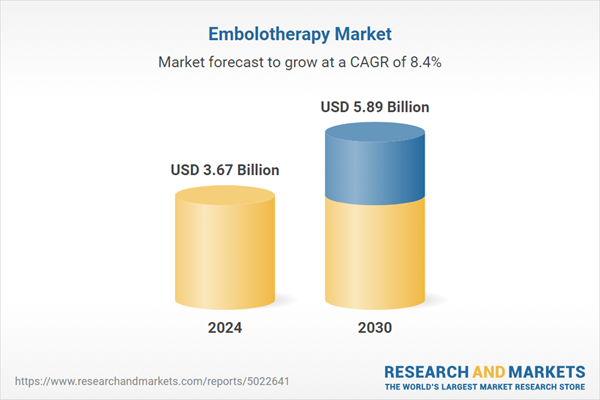Speak directly to the analyst to clarify any post sales queries you may have.
10% Free customizationThis report comes with 10% free customization, enabling you to add data that meets your specific business needs.
The applications of Embolotherapy have expanded significantly, particularly in cutting-edge procedures such as prostatic artery embolization (PAE) for benign prostatic hyperplasia and gastric artery embolization (GAE) for weight loss. Both of these procedures serve as effective treatment options for their respective conditions. PAE, in particular, is performed worldwide in over 800 procedures annually to address lower urinary tract symptoms (LUTS) caused by BPH. Embolotherapy is employed in the management of chronic pain conditions in the musculoskeletal system, including osteoarthritis, frozen shoulder, and overuse injuries. Its application in treating uterine fibroids has shown a success rate of approximately 85% globally. It is utilized in the treatment of specific types of cancer, notably liver cancer.
Key Market Drivers
Growing Target Patient Population
Cardiovascular disease (CVD) is a significant target ailment, and its importance and high prevalence have made it a focal point for research into successful and effective treatments. For instance, in May 2023, a study in Stroke, the American Stroke Association's leading journal, detailed a groundbreaking in-utero surgery to treat a fetal vein of Galen malformation - a rare, life-threatening cerebral vascular disorder. This successful intervention highlights the expanding target patient population for embolotherapy, driven by advances in prenatal diagnostics and treatment. As awareness and early detection grow, demand for innovative embolization solutions in both pediatric and fetal care is expected to rise.In 2017, peripheral vascular diseases affected over 200 million individuals worldwide. According to the same source, the prevalence of these diseases rises with age, with a prevalence rate of over 20% in those aged 80 and above. The increasing demand for Embolotherapy devices will be driven by the notable success rate and low postoperative complication rate associated with Embolotherapy procedures, coupled with the rising incidence of liver cancer and hepatocellular cancer. Liver cancer ranks as the fifth most common cancer in men and the ninth most common cancer in women, with over 840,000 new cases diagnosed worldwide in 2018 (source: World Cancer Research Fund). The kidney cancer incidence rates in the United Kingdom have witnessed a significant 42% increase over the past decade, with males experiencing a 38% incidence rate and females a 44% rate.
Key Market Challenges
Stringent regulations
Artificial embolization devices, including permanent microspheres used as artificial emboli (AED), are classified as medical devices. These devices function by physically closing vessels and are regulated as Class II vascular and neurovascular embolization devices in the United States. In the European Union, they are classified as Class IIB bland embolization devices under the medical device directive MDD 93/42/EEC. PVA particles have been used for over 40 years as a comparison device, serving as the basis for approval or authorization of later next-generation items due to their demonstrated general embolization of vessels.Key Market Trends
Increasing Acquisitions and Collaborations
Increasing acquisitions and collaborations can indeed contribute to an increased demand for embolotherapy in the future. Collaborative efforts within the healthcare industry often lead to enhanced research, development, accessibility, and awareness of medical procedures like embolotherapy. Collaborations between pharmaceutical companies, medical device manufacturers, and research institutions can accelerate the research and development of new and improved embolotherapy techniques, devices, and materials. This can lead to innovations that increase the effectiveness and safety of embolotherapy procedures. Acquisitions and collaborations bring together the expertise of different entities. This multidisciplinary approach can lead to the creation of comprehensive and integrated embolotherapy solutions that cater to diverse patient needs.Key Market Players
- Medtronic, PLC
- Microport Scientific Corp
- Boston Scientific Corporation
- Stryker Corporation
- Terumo Corporation
- Penumbra, Inc.
- Sirtex (CDH)
- Johnson & Johnson
- Abbott Laboratories Inc.
- Balt Group (Balt Extrusion SAS
Report Scope:
In this report, the Global Embolotherapy Market has been segmented into the following categories, in addition to the industry trends which have also been detailed below:Embolotherapy Market, By Product:
- Embolic Agents
- Microspheres
- Liquid Embolic Agents
- Coil
- Microcatheters
Embolotherapy Market, By Indication:
- Oncology
- Vascular
- Aneurysm
- Urology
- Nephrology
Embolotherapy Market, By Procedure:
- TACE
- TARE
Embolotherapy Market, By End User:
- Hospital
- Clinics
- Ambulatory Surgery Centres
Embolotherapy Market, By Region:
- North America
- United States
- Canada
- Mexico
- Europe
- France
- United Kingdom
- Italy
- Germany
- Spain
- Asia-Pacific
- China
- India
- Japan
- Australia
- South Korea
- South America
- Brazil
- Argentina
- Colombia
- Middle East & Africa
- South Africa
- Saudi Arabia
- UAE
Competitive Landscape
Company Profiles: Detailed analysis of the major companies present in the Global Embolotherapy Market.Available Customizations:
With the given market data, the publisher offers customizations according to a company's specific needs. The following customization options are available for the report.Company Information
- Detailed analysis and profiling of additional market players (up to five).
This product will be delivered within 1-3 business days.
Table of Contents
Companies Mentioned
- Medtronic, PLC
- Microport Scientific Corp.
- Boston Scientific Corporation
- Stryker Corporation
- Terumo Corporation
- Penumbra, Inc.
- Sirtex (CDH)
- Johnson & Johnson
- Abbott Laboratories Inc.
- Balt Group (Balt Extrusion SAS)
Table Information
| Report Attribute | Details |
|---|---|
| No. of Pages | 190 |
| Published | August 2025 |
| Forecast Period | 2024 - 2030 |
| Estimated Market Value ( USD | $ 3.67 Billion |
| Forecasted Market Value ( USD | $ 5.89 Billion |
| Compound Annual Growth Rate | 8.3% |
| Regions Covered | Global |
| No. of Companies Mentioned | 10 |









